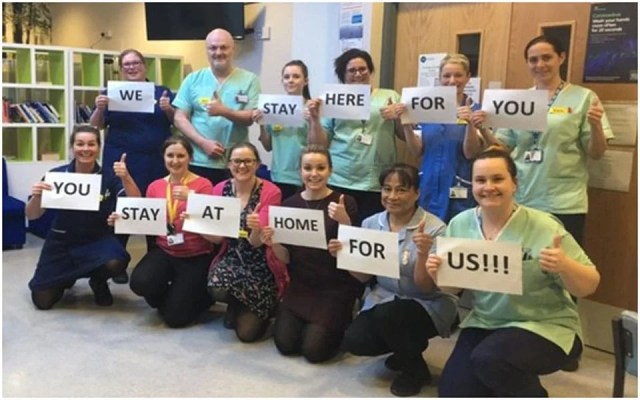UK: Evolution of response to Covid-19
Social distancing and stay-at-home directives seem to be helping in reducing the spread of the hidden enemy
By Kishore Teelanah
At the time of writing (March 21), coronavirus (Covid-19) has already caused over 42,000 deaths worldwide and still counting, causing shock in the whole world in the medical, scientific, political spheres. Originating in the city of Wuhan, China in December 2019, causing deaths rising on a daily basis, this has pushed world leaders to take drastic actions like isolation and lockdown in order to halt its devastating progression. During the last month, Europe has been the worst hit with most of the deaths occurring in Italy, Spain, France and UK.
Coronavirus live: Cases around the world

The Independent – 21st March 2020
With the explosion of cases in Wuhan, Public Health England announced that it was moving the risk level in Britain from “very low” to “low”. This prompted Heathrow airport to screen all arrivals from Wuhan. In early March, Italy announced it was shutting schools and universities amid what was developing with the worst outbreak in Europe.

Before the 2-metre distancing rule, doctors and nurses promoting strict government rules. Photo – bing.com/images/search
In the meantime, UK’s death rate and spread were much lower, due to being at an incubation period; hence all the businesses remained fully functional. There was some complacency during early March 2020, whereas Wuhan imposed a lockdown right at the outbreak of the viral infection. After seeing the dire effects in EU countries, the British government took strong action by mid-March. Many universities had already started online teaching, with very few students on campuses, and some companies followed suit with people working from home. By 16th March, many schools and colleges were shut, leaving only skeleton staff present. Only key workers in the National Health Service (NHS), the police, paramedics and other volunteers were allowed to travel to perform their duties.
Prime Minister Boris Johnson made regular live announcements to discourage people from travelling to work unless it was absolutely necessary. Soon many more businesses and the transport hub were shut down in order to reduce cross-infection. It was reported that one person can spread this virus to 10,000 other people, and it keeps escalating exponentially. This is what prompted the UK population to stay at home for the second week. Most places have two-metre distance rule as well as a controlled number of shoppers going inside. This has brought about the long supermarket queues, with delays in shopping. There has been panic-buying, which left many supermarkets short of toilet paper, bread, eggs, soap, hand washing gels and many other items.

The effect of coronavirus crisis in UK food supplies and business
The result has been an unexpected doom in the business world. As employers all over the world reflect on the state of the economy, the domino effects will continue in Britain. The new Chancellor or Exchequer of UK, Rishi Sunak, has provided a generous package to help with loss of earnings, which he described as an unprecedented government intervention on a scale unimaginable a few weeks ago. Any business that needs access to cash will be able to apply for government-backed and guaranteed loans worth a total of £330 billion, promising that he would make more available if demand was greater in the weeks ahead.
The virus has now reached almost every country in the globe with more than 850,000 confirmed worldwide cases at the time of writing. The social distancing and stay-at-home directives seem to be helping in reducing the spread of the deadly and hidden enemy. While the travel and tourism industry and other businesses have suffered, there are other pitfalls ahead.
The plea from the British government has drawn 20,000 doctors and nurses as well as paramedics from retirement to help control the spread of Covid-19. Many final year medical students have also volunteered. More ventilators and testing kits have been ordered from motor manufacturers and Dyson to enable testing tens of thousands more people. In readiness to cope with the rapid spread of the pandemic as it is reaching its peak, some more hospitals are being built, such as Nightingale hospital in London which can accommodate 4000 beds for corona cases and this will be replicated in cities such as Manchester, Birmingham, Glasgow and even in Northern Ireland.
Kishore Teelanah holds the post of Section Manager for Science in a College of Further and Higher Education (London). He left Mauritius for the UK in 1974 and started his career with the NHS as a nursing officer. He has over 34 years of experience in teaching, learning and education management in Science having worked in many educational establishments at different levels. He has special interest in the Biomedical Sciences. He also promotes STEM subjects across schools, colleges and higher education institutions, and is a mentor to final year bioscience degree students at Kingston University.
* Published in print edition on 7 April 2020
An Appeal
Dear Reader
65 years ago Mauritius Times was founded with a resolve to fight for justice and fairness and the advancement of the public good. It has never deviated from this principle no matter how daunting the challenges and how costly the price it has had to pay at different times of our history.
With print journalism struggling to keep afloat due to falling advertising revenues and the wide availability of free sources of information, it is crucially important for the Mauritius Times to survive and prosper. We can only continue doing it with the support of our readers.
The best way you can support our efforts is to take a subscription or by making a recurring donation through a Standing Order to our non-profit Foundation.
Thank you.




